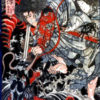I won’t be speaking of a specific pantheon of spirits. Even to enumerate the traditional magatsuhi -no-kami would be a futile effort, but the concept behind the kami in general, and the dark kami in particular, is helpful for understanding the world of spirits in any culture.
Anyone here familiar with Shintoism? It’s a syncretic faith that arose in Japan, a sort of merger and evolution of the native shamanic traditions. They revere all kami but give the most reverence to a group of spirits referred to as the court of heaven, and by heaven they mean the moon, and sun, and stars.
So there are specific gods/goddesses in the court? Oh, yes. Amaterasu. Raiden.
Kuan yin? Kuan yin is Chinese, but is connected conceptually to Amaterasu.
In Shintoism, they also acknowledge other spiritual beings including the divinities of faiths from other countries. Japan, like China, shares a spiritual disposition that involves taking your spiritual understanding where you find it. Some people are surprised when they discover that a great many Buddhist sects don’t appear “religious” in the western sense.
About kami, kami are everywhere. They are the spirit of everything in existence, and they display differing degrees of spiritual integrity and advancement. The majority of kami are peaceful, exhibiting a sort of citizenship in the great community of the spirit world. And the human followers of the Shinto way focus on keeping this code as the centre of their lives as well. Departed ancestors as well as the spirits behind natures presences are included in Shinto reverence, and for the most part, as far as a practitioner of the Shinto way keeps to right action in their life, it is believed that they will experience prosperity. The world will work as it is meant to.
Now Shintoism doesn’t involve a heaven or hell in the western sense. Someone who is virtuous in life goes on to dwell among the kami, heaven being the kingdom of the gods. But for those who didn’t preserve an adequate spiritual purity, they would go on to inhabit the land of the dead. The dead being those who have cut themselves off from the life all other spirits share, giving rise to the hungry ghosts among other things you may have heard of.
Spiritual purity vs. compassion. I think this is the source of much trouble in the West. I would agree. Westerners aren’t much encouraged these days to develop an intuition for spiritual balance, not as a whole.
Remember I said earlier that everything has a kami? Not all kami observe purity. There are those that from their own natures promote events and conditions that undermine spiritual cleanliness. Wrong doing in Shintoism burdens you with a weight or taint. This can be dealt with if you are sincere in seeking liberation from it.
But there are kami that of their own nature add burden to the human spirit, usually linked to various forms of profanity. They bring illness in the simplest cases. In the case of a kami bearing illness, how much you are burdened by it afterward is dependent on your personal attitude. They are also associated with the various forms of misfortune.
The kami aren’t separated from each other in an immediately obvious sense. There are kami of sacred fire, but there are also kami of poisonous, ruinous fire as well.
Your thoughts are welcome. Be well friends.
Travis Saunders
Dragon Intuitive
~science,mysticism,spirituality~



Leave a Reply